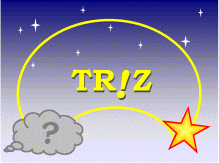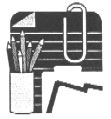 TRIZ
Textbooks: CID Course for Children, 1-1G5 TRIZ
Textbooks: CID Course for Children, 1-1G5 |
  
|
Topic 5. What can
one do and why?
(Functions
of the systems) |
Fairy Tales
School:
Course of Creative Imagination
Development (CID), 1st Grade, 1st Semester, Methodical Guide-Book |
Natalia
V. Rubina, 1999 [published
in Russian]
English
translation by Irina Dolina,
May 23, 2000
Technical
Editing by Toru Nakagawa, Feb.
28, 2001 |
Posted
in this "TRIZ Home Page in Japan" in English on Feb. 28, 2001 under the
permission of the Author.
(C) N.V. Rubina,
I. Dolina, and T. Nakagawa 2001 |
 |
Topic 5. What can
one do and why?
(Functions
of the systems) |
Workbook
The topic "What can one do " is one
of the most difficult in the first grade. Try to arrange your class
in such a way that the main idea is conveyed along various representative
systems:
1. The teacher demonstrates what the
kids should do.
2. One of the students (or the whole
class) says what should be done.
3. The kids independently do the exercises.
1. Warm up (Card Index for the First Grade)
2. Homework check-up
3. Introduction to the lesson

Emil has a new riddle for you.
While measuring small kids' temperature the
doctors have a problem: a child can't wait till as long as needed.
What should be done?
You will be helped by:
A kind.........................
He is sitting under the tree,
Come to be treated
A cow and a wolf.....
[Translation Note: This
is a fragment of a popular Russian poem for the children "Doctor Powderpill".
Every child in Russia is supposed to know this kind-hearted character.]
| Draw a picture of
what your new assistant can do. |
4. Main topic
 |
Name parts of a pen, that helps to write .............................
And can you write without a pen?
Prove it .....................................................................................................
............................................................................................................................................................. |
This task prepares the kids to perceive one of the central
and difficult notions - perfection. An ideal system is a system that does
not exist but its function is performed. We will perform this activity
not once. For the first grade students it is enough just to remember
that any system is created to perform a certain function. It can
be performed by other systems and this is often used in solving problems.
As a rule systems have many functions. To put it another words, the
more resources the system have the more functions it can perform.
| A function is what the system
is meant for. Each system can perform many functions depending on
different properties. |
This task is one of the variations of the previous one.
It is arranged in a form of a game. The kids are taking part in the
game very emotionally. The image that appears helps to memorize rather
complicated notions.

Once upon a time there lived Little Mouse
in the forest. One day he went out of his hole and saw the Squirrel.
The Mouse said to himself:
"I don't want to be just a mouse. I
wish I could climb the branches like the Squirrel". In the
forest there lived a Magician and he could fulfill some wishes.
What does the Mouse lack to jump like a squirrel? ................................
- Strong claws and fluffy tail.
- The Mouse went to the magic clearing
and there were strong claws and a fluffy tail. The Mouse put them
on and back to the tree to jump. Did he succeed in doing
it?
- The tail is too heavy for him and
the claws are long and sharp. Nothing came out of it.
- The Mouse felt offended: "I don't
want to jump like a squirrel". And suddenly he saw a Fox. "I
want to run as fast as the Fox!" ....................
We mark out the subsystems and their properties,
which are necessary for performing this or that function. We try
to give them to the Mouse without changing him. We realize that every
time that something does not fit.
"I wish I could howl like a bear."
...................................................................................
..................................................
"I wish I could fly like a swallow".
...................................................................................
..................................................
I wish I could swim like a duck.
...................................................................................
..................................................
I wish I could show off like a peacock.
...................................................................................
..................................................
Now we draw the pictures of the Mouse
with the parts from other animals.
- The Mouse got any: "I am a mouse and
I can't howl like a bear, but a bear can't squeak like me,
a mouse. I can't fly like a swallow but a swallow can't nibble thin
branches like me, a mouse. I can't swim like a duck but a duck can't
dig holes like me, a mouse"
We draw a conclusion that
every system is created by a human being or by Nature in such a way that
it can carry out his job better than others. And it is very important
to use correctly various instruments.
5. Psychotechnical and developing games
The game "Masha, the Loser" 
- Every system has its own work, its
own function. But sometimes a system has to perform not only its
own work but to do something rather unusual. And a person does not
care, what is more important that the work he has planned should be well
accomplished.
Once an amazing story happened to Masha.
On a fine winter morning she as usual was in a hurry going to school.
Everybody called Masha a Loser because she would lose things all the time.
That morning Masha lost her hair clip. Masha had long hair and she
couldn't without her clip. What should she do?
- To tie up by the ribbon.
- It means that a ribbon and a hair
clip may perform the same work, the same function. What is it?
- To hold the hair.
- To make a beautiful hairstyle.
- To hold the hair seems more accurate.
And can you devise other systems, that can hold the hair.?
- A scarf.
- A band.
- Any rubber string.
- A shoe lace.
- Maybe a grass or a flower garland.
- Good guys. And now play in groups.
A group of 3-4 kids is given a task: one of
the participants loses something. And the others give him a hint
what system can replace the lost one.
Thus, you are convinced that every system
may carry out many different functions, and it is necessary to see in it
those properties or parts which will help in this or that work.
6. Activities on speech skills developing, producing the creative
product

Each of you has a piece of white paper on
your tables. Show me in 3 minutes how you can use this paper in a
very unusual way.
Mainly the paper is used for constructing
a plane or making a snow flake. After reminding of other properties,
other ways of using it. You can show them how to make origami.
7. Summing up
Check, how the kids understood
the notion of a function. They shouldn't mix up functions and properties.
[Translation Note: Lesson
2 of this Topic is missing in the text. The Author's response to
the Editor: Topics 4 to 6 are given in a little abbreviated variant.
They are complemented by plays and problems in exhibit. I can send this
exhibit on E-mail if it is necessary. (Feb. 28, 2001)]
Last updated
on Feb. 28, 2001. Access point: Editor: nakagawa@utc.osaka-gu.ac.jp





